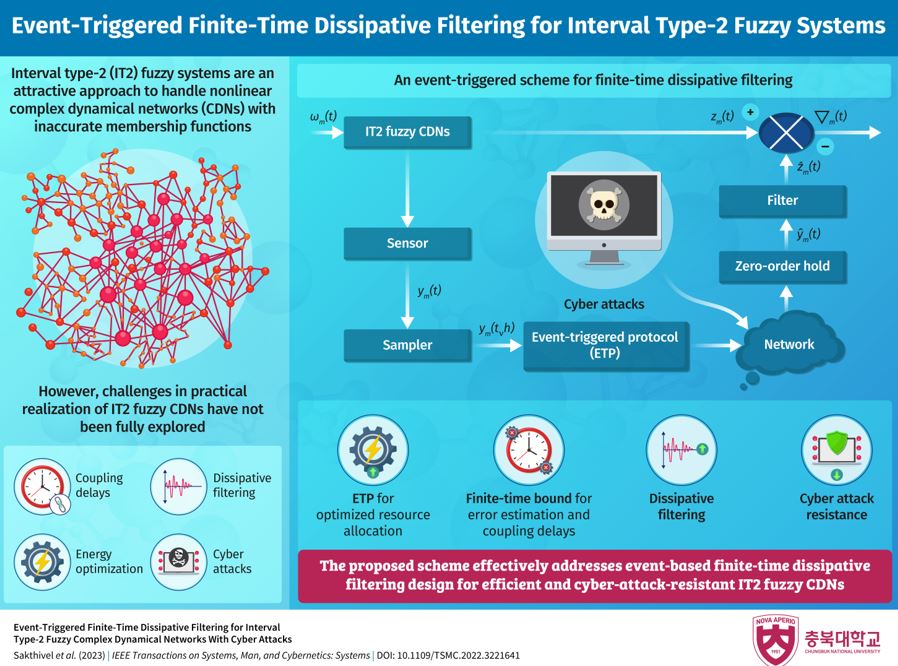
| Devise a Method to Protect Complex Dynamical Networks Against Cyber Attacks | |||||||
| Writer | 관리자 | ||||||
|---|---|---|---|---|---|---|---|

Image title: Event-triggered finite-time dissipative filtering scheme Image caption: This novel design protects interval-type 2 fuzzy complex dynamical networks from cyber-attacks using an innovative filtering technique. It also uses an event-triggered protocol to optimize resource allocation, making the networks efficient. Image credit: Oh-Min Kwon from Chungbuk National University License type: Original Content Usage restrictions: Cannot be reused without permission Chungbuk National University Researchers Devise a Method to Protect Complex Dynamical Networks Against Cyber Attacks The innovative design not only makes complex dynamical networks resistant to cyber attacks but also turns them energy efficient
Complex dynamical networks (CDNs) are inherently non-linear in nature. To tackle their non-linearity, the interval type-2 (IT2) fuzzy model has emerged as an attractive approach. However, challenges related to energy optimization, error estimation, and cyber-attacks are often encountered in the model. Researchers have now developed a novel event-triggered finite-time dissipative filtering design. It effectively protects IT2 CDNs against cyber-attacks, while also saving energy and can help safeguard crucial networks and make them more efficient. Complex dynamical networks (CDNs) such as communication networks, intelligent transportation networks, and power grids are intricate systems composed of numerous interconnected components. In such CDNs, the interactions between the components evolve dynamically over time. Due to the nature of CDNs, there is a non-linear relationship between the input and output. Researchers have traditionally employed the Takagi–Sugeno (T–S) fuzzy approach to deal with this non-linearity. Unlike classical logic which uses precise binary values of 0 or 1, fuzzy logic allows a variable to have any real number between 0 and 1 to represent partial truths.
The T–S fuzzy approach, however, faces difficulty in handling non-linear systems with inaccurate membership functions. Having emerged as an extension to the T–S approach, the interval type-2 (IT2) fuzzy model addresses this problem. Unfortunately, despite its potential for doing so, only a few studies have focused on IT2 fuzzy CDNs, leaving challenges such as high energy consumption, inadequate error estimation, coupling delays, and vulnerability to cyber-attacks largely unexplored.
To address these issues, a team of researchers from Korea, led by Professor Oh-Min Kwon from the School of Electrical Engineering at Chungbuk National University, has now developed a novel event-triggered finite-time dissipative filtering approach for IT2 fuzzy CDNs. “Applying this approach in communication networks can help mitigate cyber threats, ensure secure data transmission, and reduce vulnerabilities. Moreover, it will be effective in protecting crucial networks such as transportation systems and power grids from cyber-attacks, ensuring safe and efficient transportation as well as a steady power supply,” explains Prof. Kwon, highlighting the potential of this approach. Their study was made available online on November 23, 2022, and published in Volume 53, Issue 5 of the journal IEEE Transactions on Systems, Man, and Cybernetics: Systems in May 2023.
The proposed innovative approach employs a finite-time dissipative filtering technique to protect IT2 fuzzy CDNs against deception attacks. “Deception attack usually involves making the host under attack appear to be an error and using fake and disguised identities to legally communicate with other hosts or send false messages to them,” notes Prof. Kwon. This filtering approach accurately estimates and dissipates any errors in the system in real-time, making the system robust and capable of self-defence. Moreover, the team also employed an event-triggered protocol that optimizes resource allocation, reduces computing load, and results in energy savings.
To validate the developed approach, they applied it to a tunnel diode circuit fuzzy model and conducted simulations in which they subjected the system to a cyber-attack model that attempts random deception attacks. Their experiments revealed that the system successfully resists deception attacks while also being energy efficient.
Emphasizing the importance of these findings, Prof. Kwon says, “In the long term, the proposed approach can be extended to a wide range of complex dynamical networks. But in the near future, the study can help open up future investigations into cybersecurity, network resilience, and filtering mechanisms in dynamic networks. So far, we have investigated this approach theoretically, but in the future, we plan to apply this approach to practical systems.”
In conclusion, the developed approach has potential applications in a wide range of CDNs, including crucial networks such as power grids and intelligent transportation systems, with the promise of making them safer and more efficient!
Reference
About Chungbuk National University Established in 1951 in Cheongju, South Korea, Chungbuk National University (CBNU) proudly stands as one of the ten Flagship Korean National Universities. Guided by the core values of Harmony, Dignity, and Future, CBNU envisions a dynamic future driven by the collaborative spirit of its vibrant community. Having produced over 150,000 graduates since its inception, its alumni actively contribute to societal development. Positioned advantageously at the heart of the nation, CBNU is celebrated for its central location—a key strength. Currently ranked first for student satisfaction nationwide, the university aspires to soar among the top 100 in Asia and the top 10 in Korea, embodying a commitment to excellence and progress.
About Professor Oh-Min Kwon Oh-Min Kwon is currently a Professor at the School of Electrical Engineering at Chungbuk National University, Cheongju, South Korea. He has authored or co-authored over 280 international papers. He was a visiting scholar at Texas A&M University from 2017 to 2018. He has been a recipient of the Highly Cited Researchers Award by Clarivate Analytics from 2015–2019. He also serves as an Associate Editor for several journals, including Neural Networks, the International Journal of Control, Automation and Systems, Journal of Institute of Control, Robotics and Systems, and Journal of Applied Mathematics and Informatics. His research interests include time delay systems, cellular neural networks, robust control and filtering, large-scale systems, secure communication through synchronization between two chaotic systems, complex dynamical networks, multi-agent systems, and sampled-data control. |
|||||||
| Attachments | |||||||